'The women's agenda served to elect women, but not to defend them': Susana Muhamad speaks of her presidential aspirations for the Historic Pact

Susana Muhamad is recognized as one of the star ministers of Gustavo Petro's administration so far. Her tenure at the Ministry of the Environment gave her widespread recognition, which she now seeks to capitalize on by becoming the Historic Pact candidate in the Frente Amplio referendum in March. Speaking with EL TIEMPO, she spoke about her aspirations, her departure from the Petro government, and the reasons why she believes Daniel Quintero should not appear on the ballots for the leftist referendum.
Why, given the number of candidates on the left and center, did you decide to run? The atmosphere on the left is very positive right now with the organization of a single party, which is no small feat after so many struggles, especially between the UP and the Communist Party, and the transfer of legal status. These are no small gestures. Right now, a generation is emerging in progressivism, and I want to be part of it because I have experience and can contribute to an intergenerational dialogue with our political leader, Gustavo Petro, and the younger generation. We have to understand that we are no longer small opposition forces that can achieve a broad, majority party with a social base. Second, I want to see the change deepen, and that requires going deep into a form of social, political, and economic organization based on the country's cultural and environmental diversity.
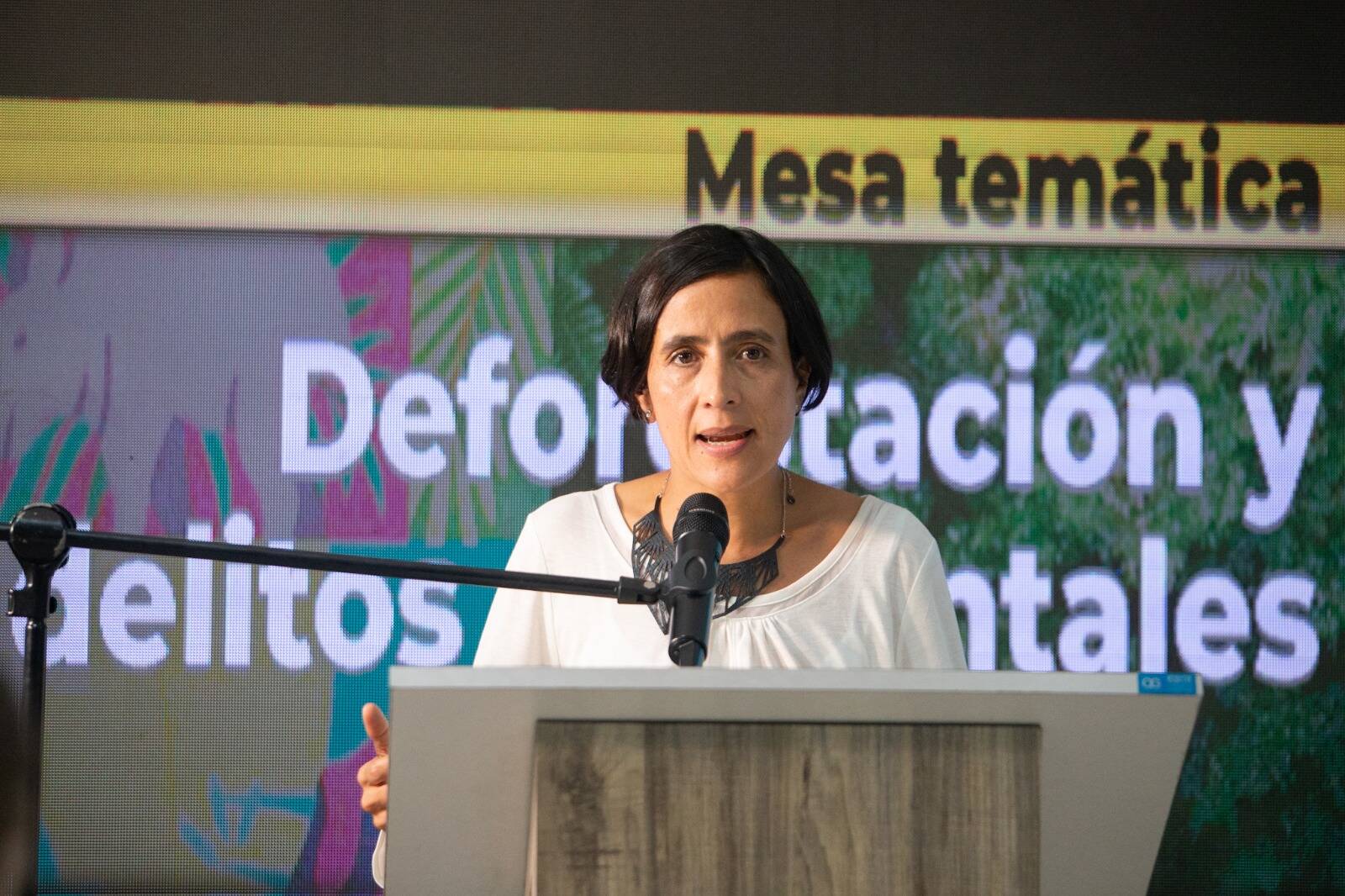
Former Minister of the Environment, Susana Muhamad. Photo: Ministry of Environment and Sustainable Development.
We will be like a dog chasing its tail if we advance economically but continue with the same inequality or if we erode the capacities for the economy and life, which should be our greatest potential. I want to create a government program that deepens change but takes into account climate security, which implies that the State guarantees water—from the moorland to the sea—food and energy security and sovereignty, health, and protection against natural disasters. From there, we must create economies for life, which is a very inclusive transformation for the country. We must be a light in the 21st century on what it means to live in the climate crisis, improve the quality of life and capabilities of our people who have suffered so much, and what it is like to live in a world at war and heading towards fascism. It is a life mission.
Since you're talking about energy sovereignty, the energy transition proposed by this government has been highlighted, but it has been questioned whether it jeopardized the sovereignty already in place in areas such as oil and natural gas. What will you do in your administration? I would deepen the government's current strategy. Strengthening the energy transition requires instruments that do not disregard biodiversity and communities. In Colombia, we can generate significant capacity for energy sovereignty and security with renewables from various sources to achieve resilience to climate events, because our hydroelectric resilience is very fragile in the face of climate change. We need to generate an ecosystem of collaboration to resolve the conflicts generated by the transition. While other candidates talk about fracking and returning to the past, we want to continue pushing toward the future. Offshore energy ensures oil and gas for as long as we need it, and what we need now, which the government hasn't done, is to address the demand for fossil fuels in the transportation, residential, and industrial sectors. We must move toward electrification, but that requires a tariff and industrial pact.
It's true that we need to move toward an energy transition, but this government has forced the country to import gas and other things from Venezuela that weren't done before... It's not true that gas wasn't imported. We've been importing for eight years. Second, there's a production gap, but it lasts two or three years while new projects come online. That's when we regain gas production security. What this government hasn't worked on, and what we must begin to do, is convert demand. We've made progress, let's say, on issues like shifting from cocinol to natural gas, but now we must move forward with electrification. Furthermore, we must understand the need for electrical interconnection with neighbors, as President Petro has proposed.
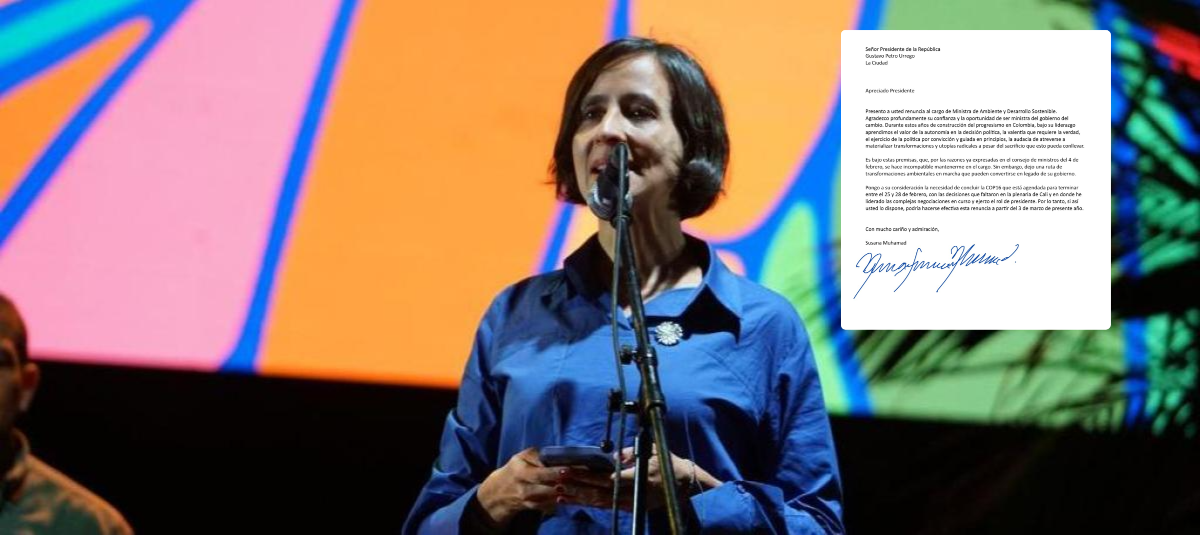
Susana Muhamad's resignation letter. Photo: X @susanamuhamad
This must be viewed in two ways. The transition is economic, and it involves ending dependence on oil exports for government tax revenue and trade balance. Decarbonization is advancing worldwide, and we cannot remain dependent on coal, which is no longer being consumed, and our oil is expensive because it's heavy. As decarbonization progresses globally, we will become less competitive. If we don't begin to replace that revenue, we will have an economic problem, like when the Prodeco mine closed in Cesar. Decarbonization is an environmental obligation, not just an economic one. Let's also look at the impact of pollution on mortality. We can become a zero-emissions hub and have large industries locate in Colombia. Decarbonizing our domestic demand is about health, tariff improvements, generating greater autonomy and resilience, and becoming a zero-emissions hub. Either we seize the opportunity or continue to dabble in fracking and 19th-century technologies.
Aren't you afraid that the government's poor image will make taboo topics like fracking become accepted as normal, and you'll want to include them in your government plans? That's why I believe in the governance of the transition and the permanent resolution of conflict. Building trust is crucial for the transition because it has happened that people feel the energy transition is a threat to the security they already have. People prefer to maintain what they have and not risk something new. If we don't guarantee security and autonomy, we could be sending out a boomerang that generates a counterforce, which is what's happening with the right wing, returning to the familiar and the past, even if that goes against the future. That's why my proposal is a public, private, community, and union governance system—because the transition also belongs to the workers—to discuss the transition processes openly and collaboratively.
Moving on to the topic of electoral politics, what's the outlook for the Pact? You even issued a statement at one point expressing concern that it was going to be a closed referendum. Last Saturday, we released the official regulations, including the procedures for the parties and pre-candidates. We've already secured an open consultation and the slates will be organized by a vote open to all citizens. The slates will then select the Pact's candidates for the Presidency and Congress.
Come October, if you're not positioned in the presidential polls, would you seek the Senate? No, the rules make it clear that presidential candidates cannot be on the Congressional list. If you want to be president, you have to be president, and if you want to be a senator, then you have to be in the Senate. But there's only one exception, and that's the runner-up in the presidential election. That, along with the woman with the most votes in the Senate and the man with the most votes, will be a political decision about who will be the top of the list. If I were to finish second, I would consider it, but I have no intention of running for Congress. I want to win the Pact's candidacy.
Speaking of the Pact, what impact has Gustavo Bolívar's message had, in which he spoke of less-than-ethical leftist strategies with influencers and wineries? I believe social media has become a very important arena for political disputes. Certain aspects of electoral campaigns must be regulated: there are currently no regulations on financing, and I believe there must be an ethical principle. On this last point, I agree with Bolívar that it must be made clear when opinions are under commercial contracts. Above all, discrediting another candidate must be avoided; that erodes the democratic principle. The idea is that legitimacy is earned through one's work, not through discredit. It's like when there are advertisements on television and it's made clear that it's paid political advertising. It's a matter of regulation and ethical principles.
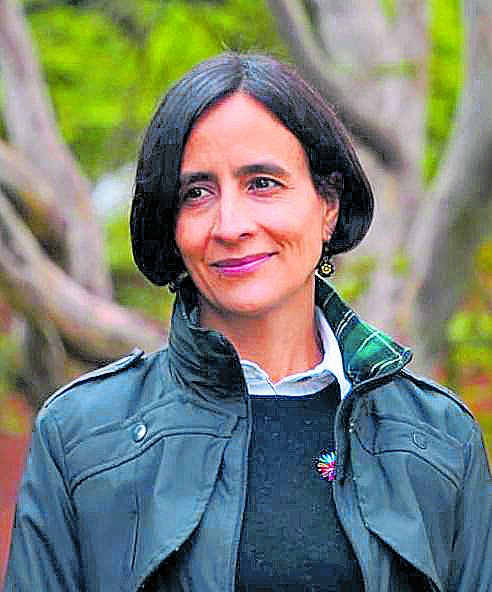
Susana Muhamad, former Minister of the Environment Photo: Private archive
Daniel Quintero should run for the Broad Front. The Pact deserves a left-wing candidate. The left must be represented in the March referendum. If one of the centrists wins, we'll support them, but we need political representation that reflects the progressive tradition.
So, Quintero isn't progressive? No, I don't see him as a leftist or progressive. He's a liberal with good marketing skills, and that's powerful in politics. Therefore, although the Pact aims to be broad and include all political and social forces, it would be unfair for it to be represented by someone who doesn't come from this political tradition. It's not because of his length of membership, but because of his logic. If he appears in our consultation, we would only be advancing the election of the Broad Front. The Pact deserves someone from within so we can have that political representation. Furthermore, I'm concerned about the political impact of the corruption allegations on the public. I'm not judging, but the allegations have a political impact that gives the opposition a hard time. We must reclaim principles of strong transparency.
Speaking of transparency, how much will the UNGRD scandal cost you? It's going to cost us a lot. We must assume political responsibility, as President Petro himself acknowledged. It happened during our administration and it's unacceptable, especially because it had to do with the water bill for the children of La Guajira. That's why we must demand candidates who offer the best guarantees. We can't be naive either; it's not that there's corruption in Colombia, but that the political system is corruption. Anyone who faces political leadership must confront scenarios in which politics works this way. But it's not that we should condone this; rather, we must understand that it's a system that works this way. That's why I believe we must implement a political reform that can only be achieved. I agree with the President on this, that it must be a constitutional reform. Attempts have been made to process it in Congress, but it doesn't pass because the corruption regime suits those in power. That doesn't mean I agree with Quintero about ending Congress. That won't end the corrupt class. What we must do is create institutions that provide better oversight. A line must be drawn: either you're with the corrupt regime or you're with the deepening of democracy. I advocate the latter, and the left has historically done just that.
But you say the left champions the fight against corruption, but the UNGRD scandal is about Olmedo López and Carlos Ramón González. You also see people in the government who have been questioned, even costing you your job... Well, there is resistance against corruption, and I am one of those resistances. I don't believe the past determines the future. I believe we must form alliances to win majorities, but to win, it must be with popular power so that the alliances have our DNA and not the other way around. That's why we need a progressive candidate for March. Only with that political power can we make alliance pacts with the others who will have alliances with the others. If we lose in March, we'll still have negotiating power with a strong candidate. What can't happen is for us to dilute ourselves before the race even begins.
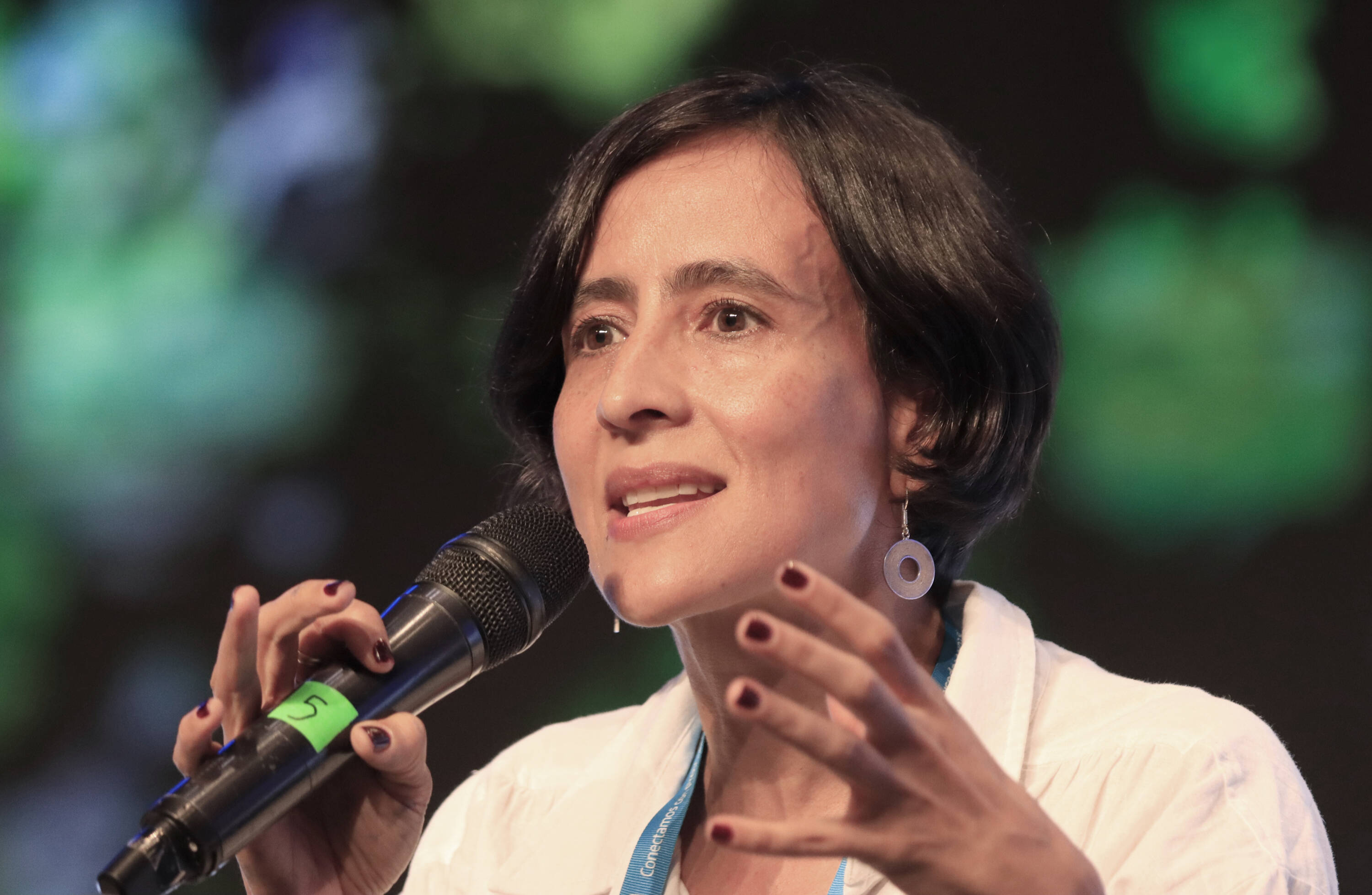
Former Minister of Environment and Sustainable Development Susana Muhamad. Photo: Ricardo Maldonado Rozo. EFE
The truth is, I had a deep discussion with President Petro. I wanted to stay in government, and we looked for a way out, but the conditions weren't right. In the end, it's better to carry out that political process outside because institutions have other logics. One can see the glass as half full or half empty. It would have been worth staying, but only if the conditions were right. Everything that was said in that cabinet meeting was reduced to what Benedetti said, but it wasn't just that issue. The conditions for continuing weren't there. But I continue fighting, and women play a fundamental role in what I propose. Without empowered women, there's no possibility of social and economic transformation. The struggle doesn't end with one government.
Is there a debt owed to women in this government? Yes. There was progress. I highlight the comprehensive rural reform that sought to grant land to female heads of households, as well as the labor and pension reforms, but there was no coordination of policies for women. There was also a gap in political representation at the highest levels. It was overlooked, always prioritizing other things. The women's agenda was marginal. It served to get elected, but not to defend it. Colombia needs a woman in the presidency who stands on the side of women's rights and who can put an end to the sexist political practices that are the common denominator in the country: the parties, the politicians, and the left are sexist.
How is your relationship with President Petro? He's fine. We're in touch, and he's quite respectful. I'm grateful that we were able to reflect with him on the situation that arose and for the political space he gave me. I'm leaving the government with great gratitude for that gesture. I continue to defend the government's project, and that's why we're going all out for the upcoming elections.
One sees that Bolívar left the government in a bad way, and so did you. Are you going to work against them in the next elections? President Petro is our natural political leader. His influence, undoubtedly, is great, not so much on us, but on the people. Even so, I'm taking a chance because I remain an activist in this process, and I don't think the President would mind me being a candidate. Each of us broadens the scope of the consultation. Furthermore, we're helping the Pact consultation get a significant turnout. All we're doing is adding value.
You hinted earlier that you would continue with President Petro's proposal for a constituent assembly. Is that correct? Yes. There are issues that Congress hasn't been able to address: political reform, justice reform, and adapting the legal system to the climate situation, given the State's shortcomings and inability to respond to this crisis. What was called the ecological constitution didn't foresee that 30 years later we would be in this accelerated global crisis, so I think we need to rethink the institutional order on this issue.
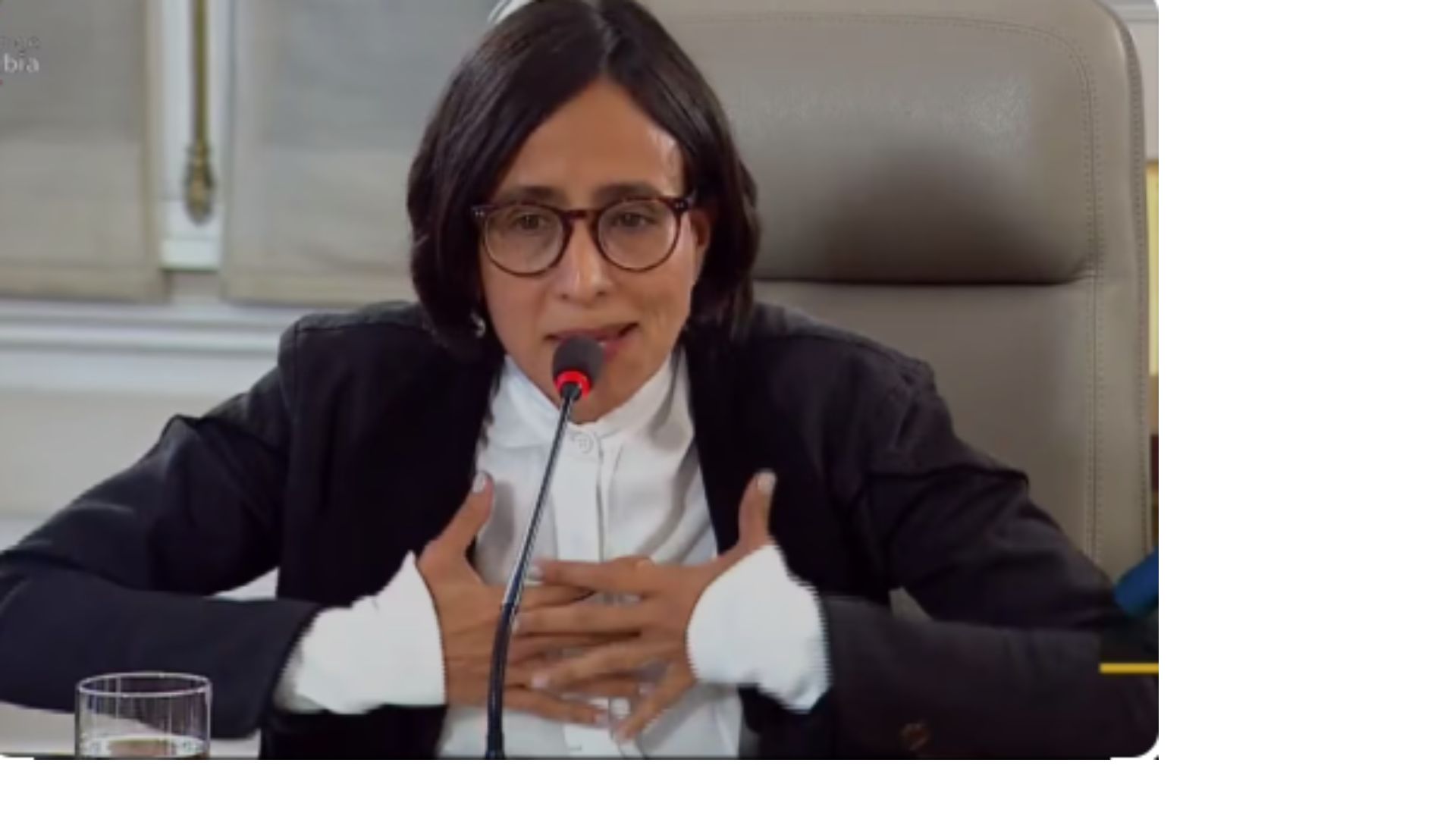
Susana Muhamad, through tears, said she couldn't sit in a government with Benedetti. Photo: Presidency of the Republic
That will depend on the balance of political forces, which is why 2026 is so important. Furthermore, the President's proposal to introduce a ballot is not a legal fact, but a political one, determining which popular force would be in favor of a constituent assembly so that the next president can consolidate popular mobilization during his term. The balance of forces will only be determined in the heat of the struggle.
Will you continue with the policy of 'total peace'? I do believe we should continue pursuing territorial peace. I disagree with the candidates who say we need to return to the military boot. The problem is that we have to make institutional adjustments. It's very important to establish legal frameworks, because comprehensive peace is doomed by the lack of them.
You talk about the military boot as something negative, but some point out that the stick was missing and that there was too much carrot in the "total peace." What's your response? I think there was a lack of clear legal frameworks for state action. That created the conditions under which negotiations were conducted. Starting with bilateral ceasefires was not a good idea. In some regions, it empowered some actors who hadn't had it before. That's why an urgent review is needed. This doesn't mean giving up on territorial peace or the possibility of legal recourse, but the conditions must be clear.
You submitted a draft decree for the Bogotá Savannah. It was widely criticized because it puts a stop to everything, and they even saw it as being against the Galán administration... Those criticisms were ridiculous. Furthermore, those who criticized were Mayor Galán and the developers in unison. They ended up drowning out supportive voices, such as the peasants of the Sabana, environmentalists, and citizens of towns and municipalities that haven't entered the Bogotá metropolitan region because they see it as an urban development and development interest. Second, what they were saying is crazy because it was a historical debt, as it's been 31 years since Law 99 stated that guidelines for the Sabana had to be issued to prevent its destruction. The interest in revenues outweighed environmental concerns over all these years. Furthermore, the resolution doesn't stop everything, but rather organizes the territory so that we have water. Last year's rationing was a sign that we must take action quickly.
President Gustavo Petro has been criticized for actions such as the "decree" and the pursuit of a constituent assembly outside the regulatory framework. What is his response? That was a political showdown of titans against the institutional sabotage of the Seventh Commission, which slapped the Colombian people in the face by shelving the labor reform without any discussion. That was the beginning of a struggle in defense of rights. Now, the decree was revoked after the reform was approved by Congress. So, in the end, Congress reached an agreement with the government. It was clear that we didn't want to sacrifice labor reform to use the referendum as a mobilization mechanism. If logical agreements are reached, the existing institutional mechanisms are used. It's also not true that the constituent assembly falls outside the legal framework; the only thing being proposed is a political demonstration so that the next government can convene, under the current rules, a constituent assembly. They can't use normative logic to deny popular political demonstrations. That's where the debate begins. Some people like to make decisions in small circles, and what President Petro has achieved is a general mobilization of the population.
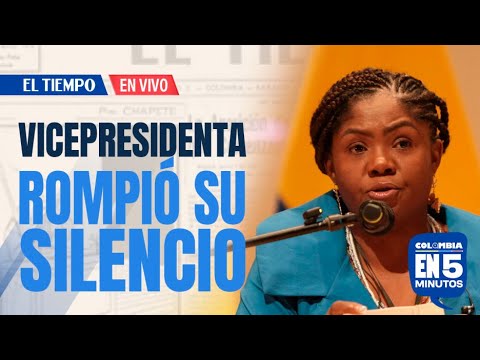
#ColombiaIn5Minutes Francia Márquez breaks the silence. Photo:
Juan Sebastian Lombo Delgado
eltiempo




